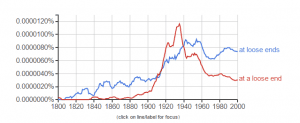To be at a loose end is to have nothing to do. It is primarily used in British English.
In the United States, there is a variant phrase to be at loose ends. This also means to have nothing to do, but it carries the connotation of nervousness, as in the situation not being able to do anything about a stressful situation. The British phrase suggests only boredom.
The ngram above shows that the global popularity of the two versions has traded places over time, with the current favorite being ‘at loose ends’. Though it should be stated that the ngram is for books, while a straight internet search finds ‘at a loose end’ slightly more popular. As with all informal phrases, research is somewhat unreliable about usage since most usage is verbal.
Examples
There’s nothing better than the smell of biscuits baking in the house. It’s also a great way to occupy any kids at a loose end who may be hanging around — although you may need to mediate disputes over who gets to lick the spoon and the mixing bowl. [The Daily Telegraph]
He said he and his wife had been at a loose end since the fire. [Ipswitch Star]
The main characters are mostly young. They are petrol station forecourt attendants, senior nightclub bouncers, or just dangerously at a loose end. [The Guardian]
Friends, some at loose ends, looking for warm conversation and companionship. An opportunity each week to feel a little less alone. [Toronto Star]
Yes, you’ll feel anxious, at loose ends, but then what? [The Star Online]

